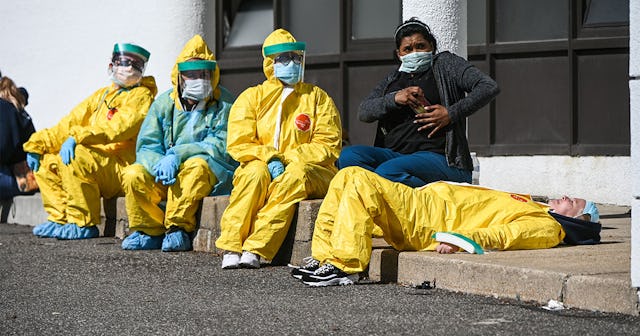Healthcare Workers Are Paying A Heavy Emotional Toll

The COVID-19 pandemic has been called a war. Doctors and nurses and other medical personnel have been equated to frontline warriors. The word “triage” is gaining more and more traction in articles that speculate on the staggering numbers of people who may lose their life to coronavirus.
People are dying. People have died. Often without family or friends by their bedside.
But they’re not alone.
There are witnesses. Doctors and nurses, who tried their best to save their patients from a disease that at times seems to choose its victims at random, are witnessing those deaths, and so much more. They are our heroes and they are paying a heavy toll for that heroism.
I’ve seen death. I’ve watched and listened as someone took their last gasping breath. I’ve felt the way a room suddenly feels empty, though no one has moved, though no noticeable shift has occurred, after that last breath is taken.
I’ll never forget the moments before and after a soul left a body. Those moments have changed me, irrevocably. And I’m often haunted by those seconds that in my memory feel like eternities. By the silence, the stillness, even as life hums and thrums and bustles around me.
As the COVID-19 pandemic rages around us, as I am safely hidden away inside my house with my two children, I cannot help but think of the medical personnel who cannot stay safely home with their kids, who are working themselves beyond exhaustion to save us all, who are seeing more disease and death than they’d ever imagined in a day.
Despite their training and what they may have seen before any of us ever heard the name COVID-19, the doctors and nurses on the front lines will be haunted. Their emotional scars will run deep. They will not be able to walk away from these days and weeks and months without being unchanged, irrevocably. Long after the exhaustion fades from their bodies, the weight they will carry will remain heavy.
Nurses in the COVID-19 unit of MedStar St. Mary’s Hospital check the fit of protective equipment before entering a patient’s room March 24, 2020 in Leonardtown, Maryland. Win McNamee/Getty
And it will not only be because they have seen too much suffering and too many labored last breaths. Soon those battling on the front lines will be asked to make impossible choices. To choose who has access to a lifesaving ventilator and who does not, who has the best chance of recovery and who does not.
I’ve only once had to make a similar choice—choose to stop treatment when all seemed lost anyway or not. Even when the choice is obvious, as it was in my situation, the small voice asking what if remains a quiet echo on dark nights long after the disaster has passed. Even with guidelines in place to make those choices, to make the choice feel more objective rather than subjective, the psychological weight remains.
They will need support, emotionally and psychologically, for grief and for guilt. Now and later.
Now, support for them is rightly visible everywhere—in the food donations made by local communities to local hospitals, in the softness of the homemade masks being delivered to hospitals running out of supplies, and in the sound of the evening clap out coming from New York City apartments. Meditation apps are offering healthcare workers free subscriptions and neighbors are decorating their windows and lawns with supportive signs. Doctors and nurses, respiratory therapists and medical technicians are feeling our collective gratitude—and I hope it helps lighten their load. Even a little.
But maybe more importantly, they will need support later. If the battle against COVID-19 is a war and healthcare workers are our frontline fighters, they will need support to deal with post-traumatic stress and burnout; they’ll need tools to help them return to normal life…or at least whatever version of normal we are left with after the pandemic sweeps through.
A doctor from SOMOS Community Care prepares to test a patient at a drive-thru testing center for COVID-19 at Lehman College on March 28, 2020 in the Bronx, New York City. John Moore/Getty
Because there will be an after. There will be a time when these days are memories, or whatever the word is for memories of days that were riddled with anxiety as we all waited with bated breath for the world to finish crashing down around us.
I’ve seen one death, made one choice, and it changed me forever. These healthcare workers are seeing so much more. Our experiences are not the same. And I can’t pretend I understand the extent of the psychological trauma they may face. I do not know whether they will remember each life they tried to save, but couldn’t, or each decision they wrestled with, and then made. I don’t know if one face will stand out to symbolize all the faces they have seen, or whether each face will make its own distinct impression. I don’t know which option would be easier.
What I do know is that I hope the support for our healthcare workers continues beyond the pandemic they stepped up for—many coming out of retirement, stepping in at a time when it would have been easier to step away. They paid the toll so the rest of us didn’t have to, and for that, I hope the psychological support is available and accessible and widespread.
I hope when the flashbacks come, because the flashbacks will come—they are inevitable and harrowing—they are soon followed by memories of the love and light that are sent to them from a distance each long, dark day.
I hope the weight they carry doesn’t define their hearts.
I hope they know they saved us all, and we’re all forever grateful.
This article was originally published on